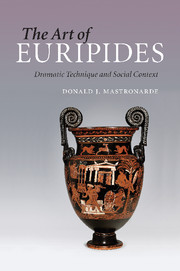Book contents
- Frontmatter
- Contents
- Preface
- Abbreviations and reference system
- 1 Approaching Euripides
- 2 Problems of genre
- 3 Dramatic structures: variety and unity
- 4 The chorus
- 5 The gods
- 6 Rhetoric and character
- 7 Women
- 8 Euripidean males and the limits of autonomy
- Conclusion
- Bibliography
- Index of names and topics
- Index of passages cited
6 - Rhetoric and character
Published online by Cambridge University Press: 04 May 2010
- Frontmatter
- Contents
- Preface
- Abbreviations and reference system
- 1 Approaching Euripides
- 2 Problems of genre
- 3 Dramatic structures: variety and unity
- 4 The chorus
- 5 The gods
- 6 Rhetoric and character
- 7 Women
- 8 Euripidean males and the limits of autonomy
- Conclusion
- Bibliography
- Index of names and topics
- Index of passages cited
Summary
In Aristophanes' Frogs, a recurrent motif in the contrast between the old style of Aeschylus and the new style of Euripides is the connection of Euripides with glib chatter and overrefined logic. The chorus' final assessment associates Euripides with Socrates, in a generalized rejection of the newfangled thought and speech associated, with comic oversimplification, with the intellectual showmen and teachers known as the sophists. The aim of this chapter is to come to terms with some of the issues raised by the obvious pervasiveness of “rhetoric” in Euripidean drama.
Following Aristophanes' lead, a long history of criticism has been concerned with the degree to which the prominence of rhetorical elements affects the notion of character and modifies or inhibits emotional involvement of the audience in the persons and events of tragedy. For some critics it has been a given that rhetoric undermines tragedy or tragic effects because it reduces the element of “spontaneity” and “sincerity” in a character's utterances. Here it will be argued that rhetoric is intrinsic to Euripides' conception of tragedy and that is it often the source of “tragic” effects, in the sense that it exposes to scrutiny the contingency of values and illusory quality of human skills. After some preliminary remarks on what “rhetoric” means in relation to Greek tragedy and how Euripides' uses of rhetoric may be distinctive, this chapter will consider the well-attested Greek ambivalence about rhetorical skill and how that ambivalence is reflected and played out in tragedy.
- Type
- Chapter
- Information
- The Art of EuripidesDramatic Technique and Social Context, pp. 207 - 245Publisher: Cambridge University PressPrint publication year: 2010
- 1
- Cited by



